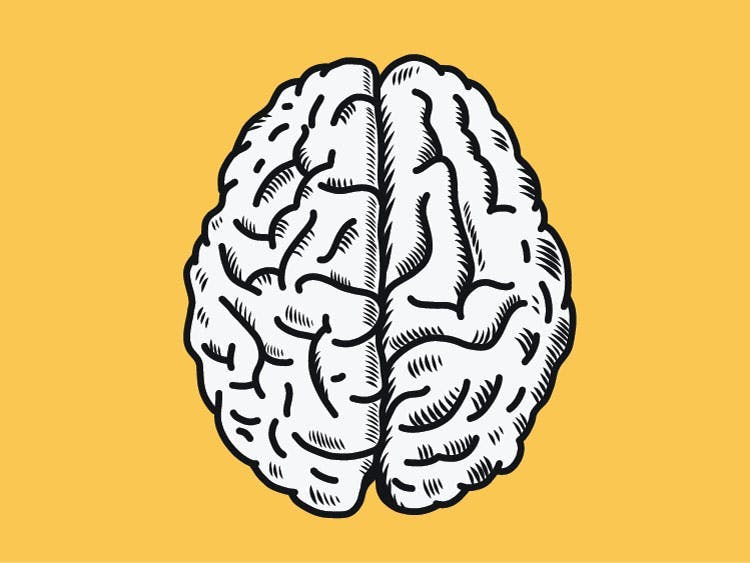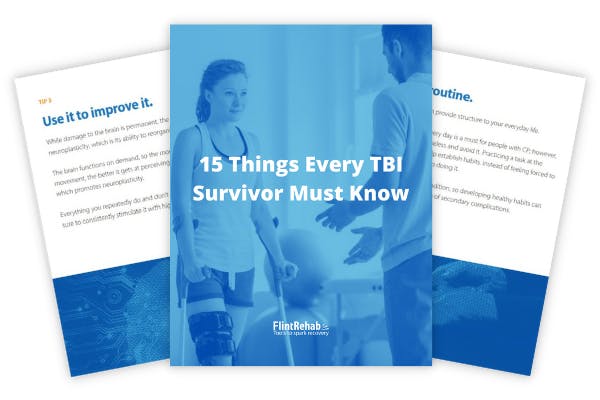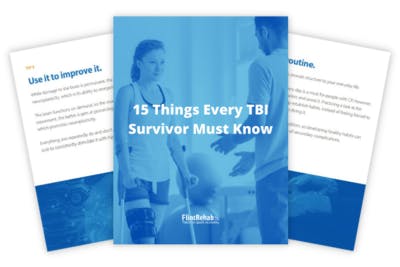No products in the cart.
No products in the cart.
No products in the cart.
No products in the cart.
Home » Neurological Recovery Blog » Traumatic Brain Injury » Right Hemisphere Brain Damage: What to Expect and How to Recover
Last updated on October 26, 2021

Right hemisphere brain damage can affect a wide variety of motor, cognitive, and emotional functions. For example, it can cause difficulties with memory or paralysis on the left side of the body. Being aware of the potential effects of right hemisphere brain damage can help you quickly identify complications and seek treatment to improve your quality of life.
To help you better understand and cope with right hemisphere brain damage, this article will discuss:
To understand how a right hemisphere brain injury will affect you or your loved one, it helps to understand what functions are regulated by the right side of the brain. The brain is divided into two sides: the right and left hemispheres. In general, the left hemisphere controls a person’s logical and verbal functions, while the right hemisphere is in charge of non-verbal and intuitive functions.
Some non-verbal, intuitive functions that the right hemisphere of the brain is responsible for regulating include:
Additionally, the right side of the brain controls movement and perception on the opposite (contralateral) side of the body. Therefore, the ability to move the left side of your body and process visual stimuli on the left side is all attributed to the right hemisphere of the brain.
When the right hemisphere of the brain sustains damage, individuals may experience various secondary effects that lead to difficulties performing tasks that require these functions. Up next, we’ll discuss 10 potential effects of right hemisphere brain damage.
Want 20 pages of brain injury recovery tips in PDF form? Click here to download our free ebook “15 Things Every TBI Survivor Must Know” (link opens a pop up for uninterrupted reading)
An injury to the right hemisphere of the brain can result in many cognitive and physical difficulties, which can affect your ability to process information, interact with your surroundings, and communicate with others.
Below is a list of some of the most common effects of right hemisphere brain damage.
Right hemisphere brain damage often causes difficulties concentrating and focusing on a task. It can also make it hard to follow a conversation or focus on what another person is saying.
One area of the right hemisphere that plays a major role in attention is the lateral intraparietal cortex. This area helps us visually focus on important objects and filter out other stimuli. For example, it plays a major role in paying attention to pertinent signs on the road while driving, while filtering out less important environmental information such as billboards.
When this region is damaged in an injury, it becomes extremely challenging to filter out other stimuli. As a result, the person’s attention skills are severely reduced.
Right hemisphere brain damage can also lead to problems remembering new and old information, as well as difficulties recalling the date, time, or place.
Several brain regions are involved in the processes of memory and new learning. Damage to any of these areas can cause memory problems. Some of the main areas of the brain that are in charge of memory include the:
Damage to the right side of any of these structures can lead to memory problems, which explains why memory loss is one of the most common outcomes of right hemisphere brain injury.

Each hemisphere of the brain controls movement on the opposite side of the body. Therefore, brain damage to the right hemisphere often leads to muscle weakness or paralysis on the left side of the body.
In addition, right hemisphere brain injuries can cause problems with processing information in the left visual field, often called left-side neglect. A person with left-side neglect may not notice objects on their left side, as their brain is having trouble processing information from this side of their environment. They may also have trouble reading words on the left half of a page and even ignore food on the left side of their plate.
There are various ways to work on managing and improving left-side neglect, including sitting on an individual’s left side when talking with them and putting an ending point (such as a bright yellow bookmark) on the left edge of a page to encourage reading all the way across.
Often, individuals with left-side neglect are unaware that they have a problem. This is related to another secondary effect of brain damage called anosognosia, which we will cover in more detail later on in this article.
Right hemisphere brain damage can lead to the inability to recognize familiar faces known as prosopagnosia. If you have this condition, looking at the face of your best friend may feel like looking at a stranger.
Prosopagnosia is caused by lesions to the fusiform face area located on the inferior temporal cortex. Some individuals with prosopagnosia can still recognize facial expressions and cues, but those with more severe forms cannot. For example, they may not know that a smile means a person is happy.
However, prosopagnosia does not make you forget a person or mean you have no way of identifying them. For example, individuals with this condition are often able to recognize their loved ones’ voices and identify them in other ways.
The right hemisphere of the brain plays a crucial role in social skills, which can be lost after brain injury. For example, people with right hemisphere damage may have difficulty interpreting abstract language such as metaphors or understanding humor and non-verbal cues.
Additionally, right-side brain injuries can affect a person’s empathy. This makes it challenging to understand another person’s emotions and point of view. As a result, individuals may make inappropriate or rude comments.
Right hemisphere brain damage may make it difficult to arrange information, which can cause problems with executive functioning skills such as organizing and planning basic tasks.
Additionally, damage to the right hemisphere may lead to impaired judgment when it affects a person’s insight or ability to understand the consequences of an action. Often, individuals with right hemisphere brain damage struggle with self-awareness, which can make it challenging to control their actions.
Generally, the left side of the brain is in charge of logic and reason. However, the right side contributes to those skills as well. Because the right side controls our imagination and helps us organize information, it allows us to perceive things more fully and generate creative solutions. If the right hemisphere of the brain is damaged, this can severely hamper a person’s ability to identify and solve problems.
The right hemisphere affects a person’s awareness and appreciation of music. This awareness also plays a part in the way we speak.
Normal speech has a natural melody to it. As we speak, our voices fluctuate between different pitches and tones to convey mood and emphasis. When a person suffers damage to the right hemisphere of the brain, not only is their ability to appreciate music diminished, but they may have trouble picking up on the subtle changes in pitch or tone during their speech.
This diminished musical ability causes the person to sound monotone when speaking, giving them an almost robotic-like voice.

Major parts of the emotion center of the brain are located in the right hemisphere. Therefore, damage to the right hemisphere may cause you to feel emotionally out of control. Two conditions that may develop after right hemisphere brain damage include pseudobulbar affect and flat affect syndromes.
Pseudobulbar Affect Syndrome causes extreme mood swings after brain injury. You may go from laughing to crying in a matter of seconds, for no apparent reason. You can also fly into fits of rage after a small inconvenience.
Flat Affect is a severe reduction in emotional expressiveness, which is typically seen through a lack of facial expressions. This condition can also reduce a person’s verbal expression of emotion.
Anosognosia is a common effect of right hemisphere brain damage. It occurs when the patient denies that they have any effects of brain injury at all. While it might seem like this is a psychological coping mechanism, it is actually deeper than that. The person truly cannot tell that anything has changed, meaning they have poor insight into their deficits.
The root cause of agnosia is a neurological problem. For example, in anosognosia patients, the part of the brain that detects feedback from the left side of the body malfunctions. As a result, the person feels like they can move their left side when in reality they cannot. This can make it difficult or nearly impossible to get the person to participate in therapy, and it can also cause great safety concerns.
Working with a diverse team of rehabilitation specialists can help ensure that all the secondary effects of right hemisphere brain damage are addressed.
Some common rehabilitation therapies used to treat right hemisphere brain injuries include:
Right hemisphere damage can cause a variety of problems. But if you persevere with your therapy, it is possible to regain the skills and abilities you’ve lost — even years after injury.
This is possible because your brain possesses a natural ability to rewire itself known as neuroplasticity. By practicing your therapy exercises every day, you can stimulate the brain and reinforce demand for those functions. This encourages the brain to make adaptive changes and rewire affected functions to unaffected regions of the brain. The more you practice, the better these skills will become.
Right hemisphere brain damage can affect a wide range of cognitive functions and impair motor control on the left side of the body. Fortunately, these skills can often be improved through highly repetitive and task-specific practice.
We hope this article helped you understand what to expect after right hemisphere brain damage and the importance of participating in rehabilitative therapies.

If you like our content, you’ll love our ebook and newsletters! Get instant access to our TBI recovery tips ebook with 20 pages of helpful advice by signing up below.
You’ll also receive our emails that share survivor stories and more useful TBI recovery tips, which you can opt out of at any time. (We know you’ll love them, too.)
We will never sell your email address, and we never spam. That we promise.


Time with a speech therapist is extremely valuable during recovery, especially if you struggle with communication, critical thinking, or memory after brain injury. Insurance typically covers speech therapy for a fixed amount of time. But once it’s over, recovery is in your hands.
That’s why a team of neuroscientists and clinicians from Boston University created the CT Speech & Cognitive Therapy app. Designed for those recovering from stroke, TBI, or living with neurological conditions, the app contains over 100,000 cognitive exercises that are all available right from your phone or tablet. That’s like having a speech therapist by your side whenever you want!
This app is the perfect fit if you want to improve your speaking, memory, or general mental sharpness. And, it’s affordable at just $29.99/month!
“For the past 6 months, my son has used the app about three times a week. The app is like a virtual therapist, it’s very easy to use, and it gives him immediate feedback.
He now understands things faster, can make decisions with less hesitation, has improved recognition of words, and his confidence is higher. I also find it easy to get in touch with customer service; they pleasantly help out. The whole experience has been great.”
— Miriam
With the CT App, you can get the guidance you need right from your phone or tablet. You can use it on your own or in between sessions with your speech therapist.
Whether you struggle with aphasia, memory loss, or critical thinking, the CT Speech & Cognitive Therapy App can help.
“The CT app has helped me gather my confidence by building on and reinforcing old forgotten skills. It helps to see my percentages increase, and work harder when they decrease. It’s very self-motivating.” -Kathryn
We are confident that this app will help improve your speech and cognitive function after brain injury. Like our recovery tools, the CT App is also covered by our 30-day money-back guarantee.

Do you know these 15 TBI recovery tips?
Get a free copy of our ebook 15 Things Every TBI Survivor Must Know. Click here to get instant access.
Grab a free rehab exercise ebook!
Sign up to receive a free PDF ebook with recovery exercises for stroke, traumatic brain injury, or spinal cord injury below: